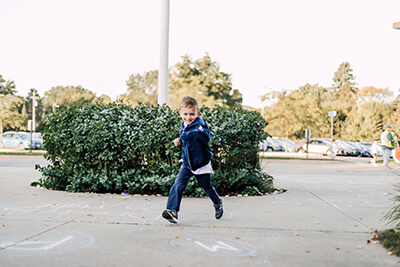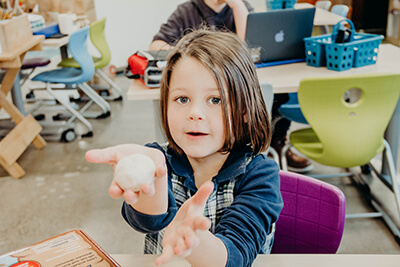January 17, 2020
 Three-year-old children are amazing sponges. They absorb everything around them, learning intuitively and actively. As toddlers approach the start of Pre-Kindergarten, it’s a unique and important time to match children with high value educational programs that will meet a broad range of developmental needs, while setting the stage for future success in school.
Three-year-old children are amazing sponges. They absorb everything around them, learning intuitively and actively. As toddlers approach the start of Pre-Kindergarten, it’s a unique and important time to match children with high value educational programs that will meet a broad range of developmental needs, while setting the stage for future success in school.
In Suzanne Bouffard’s book “The Most Important Year,” she discusses best practices for the earliest years of school. During an interview with National Public Radio, she explains that successful PreK programs “have hands-on experiences and opportunities for children to learn about things that apply to their lives. Good teachers always engage children in rich conversations and ask them open-ended questions.” Bouffard emphasizes that “another really important piece of a good program is that it focuses on things like self-control and behavior in the class, how to wait your turn, how to share, how to deal with frustration, and how to solve conflicts. Those are skills kids are just beginning to develop at three, four, and five years old.”
Bouffard outlines that classroom activities should be interdisciplinary, celebrating a young student’s dynamic nature while providing goal-oriented learning opportunities. “The research says very clearly that children learn through play and this notion that you have to choose between play and academic learning is a false dichotomy,” she says. “One study showed that you can give children building blocks and let them build whatever they want. Or you can give children building blocks with a goal—to build a landing pad for a helicopter, for example. In both cases, everybody ends up having fun and learning something, but the kids who had a goal actually used richer vocabulary, especially around spatial skills and building concepts.”
Joyful Learning: PreK at MPA
Mounds Park Academy, one of the top two private schools in the seven-county Twin Cities metro area and one of the nation’s top STEM schools, serves students through 12th grade and features a PreK program infused with joyful, hand-on learning. MPA’s rich curriculum is outstanding starting point for your child’s college prep education, reflecting national best practices and cultivating the intellectual, emotional, and social needs of young children in a safe and welcoming environment.
The MPA early education program focuses on discovery, creative exploration, and natural curiosity by facilitating the education of the whole child. Cornerstones of the PreK program philosophy include:
- A classroom environment where each child is valued, and where warm, nurturing relationships are evident.
- A child-centered approach that provides structure as well as flexibility.
- Early exposure to a wide range of disciplines and resources, including language arts, literature, math, science, social studies, health and physical education, music, visual art, drama, and technology.
- Respect for each child’s developmental level, with instruction geared toward individual needs.
- Social, emotional, and intellectual skills emphasized and shaped by guided play and group participation.
- Regular feedback and assessment information for parents regarding their child that includes conferences, written summaries, and a portfolio.
 School readiness is always an important consideration and involves several key factors. MPA PreK faculty Debbie LaChapelle and Lower School director Renee Wright offer these recommendations for assessing whether your child is prepared to start PreK:
School readiness is always an important consideration and involves several key factors. MPA PreK faculty Debbie LaChapelle and Lower School director Renee Wright offer these recommendations for assessing whether your child is prepared to start PreK:
- An attention span of at least 15 minutes; listening skills, and the ability to follow two-step directions.
- Early reading, writing, and math skills, including recognizing some letters and counting.
- Beginning stage problem solving, creativity, and both verbal and non-verbal expression.
- Communication skills such as articulating needs and feelings, and social skills like meeting behavioral expectations, sharing, and cooperation.
- Fine motor skills, including working with scissors and crafts.
- Independence and concentration, including choosing an activity on their own and being able to focus on an activity for up to 20 minutes.
- Emotional development, like the ability to say goodbye to a parent or caregiver, eagerness to go to school, and the desire to make friends.
- Stamina, with the energy and resilience to adapt to new routines and structure while transitioning to only one nap during the school day.
The Alvarenga family has been part of MPA for several years, and has seen how the school’s early education programming sets the stage for academic and personal achievement. “I would tell a family who was considering MPA that by partnering up with MPA, they are choosing a school where their child’s, physical, emotional, intellectual, social, and educational needs will be considered and supported. Parenting is a greater challenge than we could have possibly imagined. Partnering with MPA to help us educate and raise our children gives us a great sense of comfort in knowing that the school we chose is as devoted to seeing our children develop to their full potential as we are.”
Learn more about it: The Best Pre-K Programs
- NAEYC’s 10 standards for early childhood programs are based on research on the development and education of young children.
- Review the MPA PreK program philosophy, including PreK curriculum descriptions and a sample daily schedule.
- Visit us at MPA! Register for the All-School Preview on January 26, or schedule a personal tour by contacting the Office of Admission at 651-748-5577 or via email.